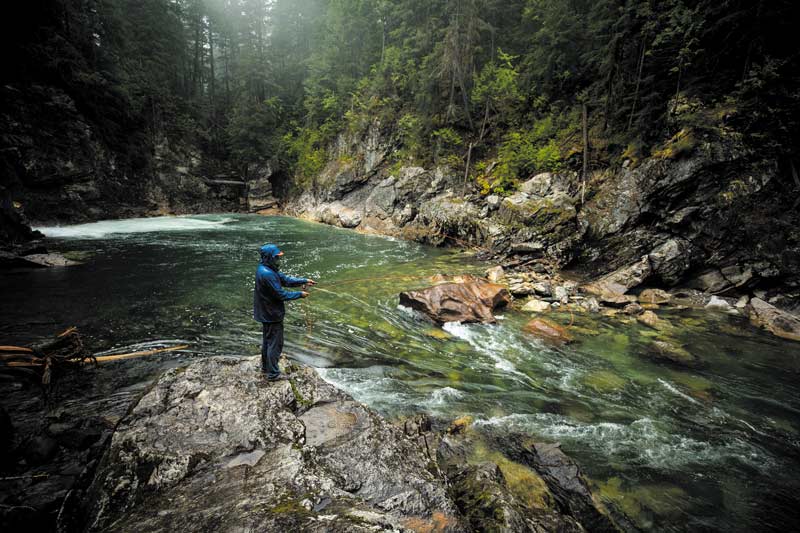
Gervais Jeffrey, 68, remembers when his fly-fishing journey began.
Just a boy at the time, he had been at a summer camp about three hours’ drive from Quebec City, a tranquil getaway run by his father’s boss. There, he watched the camp operator out on the water “catching all kinds of fish” while he, using lures instead of worms, caught nothing.
“One day,” Jeffrey explained, “I asked if I could learn what he did. [The operator] gave me a big grin and said, ‘Well, it’s about time you asked.’”
Sixty years later, and following more than four decades in the Canadian military, the army and navy veteran understands the true meaning of that moment.
“After I came back from Afghanistan in 2008, actually around the same time I was posted back to Quebec City, I used to go fly fishing on the weekends when I was tired and depressed. I felt directly connected with nature—the water running between my legs, feeling the currents, or sometimes not fishing at all and instead sitting or lying on a rock. It all brought a sense of liberty.”
Inspired to bring the same feelings to others, Jeffrey became involved in a U.S. fly-fishing project for fellow veterans. Then, in early 2019, he helped establish Heroes Mending on the Fly Canada, an organization catered exclusively to Canadian service members, first responders and their families.
With individual programs spread nationwide, Jeffrey, as national director, oversees a team of provincial co-ordinators and volunteers—most of whom are veterans—offering classes, trips and more.
Experience is never an issue, explained Jeffrey: “For beginners, we teach basic fly fishing and fly tying. There are casting classes, instructions on material care, setting up—everything.”
The group likewise supplies all the necessary gear for the first year for free. It’s merely one of several ways that the organization accommodates newcomers, regardless of their circumstances.
“One time,” noted Jeffrey, “we had a veteran with one arm. He needed adaptive equipment that could enable him to fly fish and reel the line back. We got him the devices that were actually designed for people who had lost an arm.”
Finally, there’s the option of matching beginners with more experienced anglers. Such tutorials, alongside a general sense of camaraderie, play a critical role in the program’s mission—especially for service members, former and active, with post-traumatic stress disorder or who face other challenges.
“I was going to cancel due to anxiety,” Dave, a veteran attendee, wrote to Jeffrey after a Heroes trip. “On that first day I chose to wade into the water and fish by myself…you are always safe when you are by yourself.”
“We’re there for the veterans, and we’re there for their needs.”
Once out there, however, Dave had gazed up at the evergreen hills, letting the cool lake wash over his senses. He felt his heart jump with excitement when the first fish broke the surface, and, at least momentarily, all worries disappeared. The day, he later recalled, “was probably the most peaceful…in a long time.”
Back at the fishing lodge, Dave found himself becoming more open with other veteran attendees: “we shared conversations of common experiences with regard to PTSD, which really brought to light the fact that the things I am experiencing, the sometimes cold and painful existence, is not solitary.”
Whether forming bonds akin to those in the service, sharing stories with like-minded individuals, or simply being immersed in nature, the program has helped hundreds of veterans coast-to-coast cope with difficulties.
Jeffrey is quick to assert that his organization should be seen as supplementary to conventional treatment options. Nevertheless, research does recognize the potential benefit of nature-based recreation. In one recent study, evidence suggested that fly fishing could help alleviate PTSD symptoms and perhaps, under certain circumstances, contribute to post-traumatic growth.
What remains clear is the group’s year-round dedication. “We’re there for the veterans, and we’re there for their needs,” said Jeffrey.
Even in the winter, when there are fewer opportunities to be outside, the merits of fly fishing can continue by preparing for the season ahead.
“Fly tying can teach patience,” explained Jeffrey. “We practice our motor and concentration skills in order to place the material on the hooks, sometimes working in small groups while managing stress. Where people may otherwise have been sitting alone in their homes, they’re instead focusing on something that could be meaningful. Some of those guys have said it saved their lives.”
But challenges remain in raising awareness, having enough experienced volunteers for certain provincial programs, and, fundamentally, ensuring the organization grows for the betterment of veterans’ health and wellness.
“Most of the money right now that we raise is the generosity of the Legion,” said Jeffrey, who also serves as president of Rockland, Ont., Branch. “Dominion Command supports us on the national side; so do the provinical
commands, and then there are the Legion branches themselves.”
Sponsorship funds, Jeffrey is proud to note, directly benefit veteran attendees, enabling all participants to embrace the healing power of nature.
It is, according to Jeffrey, as important now as it ever was: “Some people think that because the Afghanistan War is over, everything is over, but we’re still losing veterans to suicide, to homelessness, to drugs, and other serious issues. We need to get those veterans on their feet again.”
For Jeffrey, Dave and fellow anglers, to have feet planted firmly in water—all the while surrounded by Canada’s natural beauty—can make all the difference. And it doesn’t matter the type of fish they reel in, because the real catch is finding peace of mind.
“Trout, salmon, pike, bass,” he listed off in reference to just some of his catches, past and present. “Whatever swims in the water, I would go fish for it.”
Advertisement






















